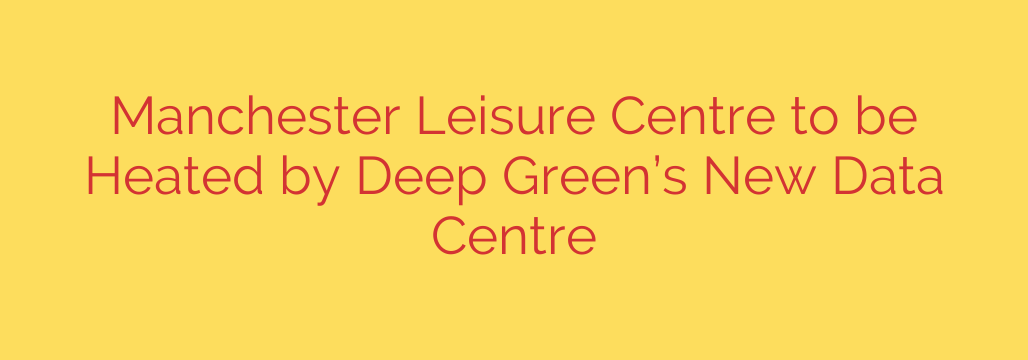
How Innovative Tech is Using Waste Heat from a Data Centre to Warm a Public Pool
In an era where energy costs are soaring and environmental sustainability is a global priority, finding innovative solutions to reduce consumption is more critical than ever. One of the most significant challenges we face is the immense energy demand of data centres, the digital backbone of our modern world. At the same time, large public facilities, like swimming pools, require vast amounts of energy just for heating. Now, a groundbreaking initiative in Manchester is tackling both problems at once with a single, elegant solution.
A local leisure centre is set to have its swimming pool heated almost entirely for free, thanks to the installation of a new, on-site data centre. This pioneering project represents a major leap forward in green computing and sustainable energy management, creating a circular economy model where waste is transformed into a valuable resource.
The Problem of Wasted Energy
Data centres are filled with powerful computers that generate a tremendous amount of heat as they process information for everything from artificial intelligence to cloud storage. Traditionally, this heat is considered a waste product. Enormous, energy-intensive cooling systems are required to vent this heat into the atmosphere to prevent the servers from overheating. It’s an inefficient model that consumes energy to produce heat, then consumes more energy to get rid of it.
On the other side of the equation, heating a large 25-metre public swimming pool is an expensive and carbon-intensive operation, often relying on gas boilers. This new project flips the script by connecting these two energy puzzles.
How Does Data Centre Heat Recycling Work?
The technology at the heart of this project is brilliantly simple in its concept. Instead of a vast, remote data warehouse, a compact, high-performance computing unit—about the size of a washing machine—is installed directly at the leisure centre. Here’s a step-by-step look at the process:
- Heat Generation: The powerful servers inside the unit run complex computations, generating significant heat.
- Heat Capture: Rather than using fans and air conditioning, the servers are immersed in a specialised mineral oil. This liquid is excellent at absorbing heat, keeping the components cool and operating efficiently.
- Heat Transfer: The now-hot oil is circulated through a heat exchanger. This device allows the heat to be transferred from the oil to the leisure centre’s water system without the two liquids ever mixing.
- Warm Water: The newly heated water is then used to maintain the swimming pool’s temperature, effectively providing a constant and reliable source of warmth.
This process essentially turns the data centre into a “digital boiler”, where the by-product of computing is repurposed directly where it’s needed most.
Tangible Benefits: Slashing Costs and Carbon Emissions
The impact of this initiative is substantial and immediate. For the Manchester leisure centre, the benefits are clear:
- Massive Financial Savings: The facility is expected to save over £100,000 a year on its energy bills. This free heat will cover approximately 60% of the building’s total heating and hot water needs.
- Significant Carbon Reduction: By dramatically reducing its reliance on traditional gas boilers, the centre will cut its carbon emissions by an estimated 258 tonnes annually. This is a major step towards meeting local and national climate targets.
- A Win-Win Partnership: This symbiotic relationship benefits everyone. The leisure centre gets a free, green source of heat, while the data centre operator gets to run its high-performance computing without the enormous expense of traditional cooling infrastructure.
The Future of Sustainable Infrastructure
This project is more than just a clever solution for one facility; it serves as a powerful blueprint for the future of urban infrastructure and data management. As the demand for data processing continues to grow, decentralized, small-scale data centres like this one could become commonplace.
Imagine a future where apartment buildings, hospitals, and community hubs are all partially heated by the data they consume. This model transforms a major source of energy waste into a community asset, creating smarter, more resilient, and more sustainable cities.
For facility managers, city planners, and business leaders, this project offers a crucial lesson: the most effective solutions are often found by rethinking waste. By looking for opportunities to create circular systems, we can build a more efficient and environmentally responsible future for everyone.
Source: https://datacentrereview.com/2025/10/deep-greens-latest-data-centre-will-help-heat-manchester-leisure-centre/








